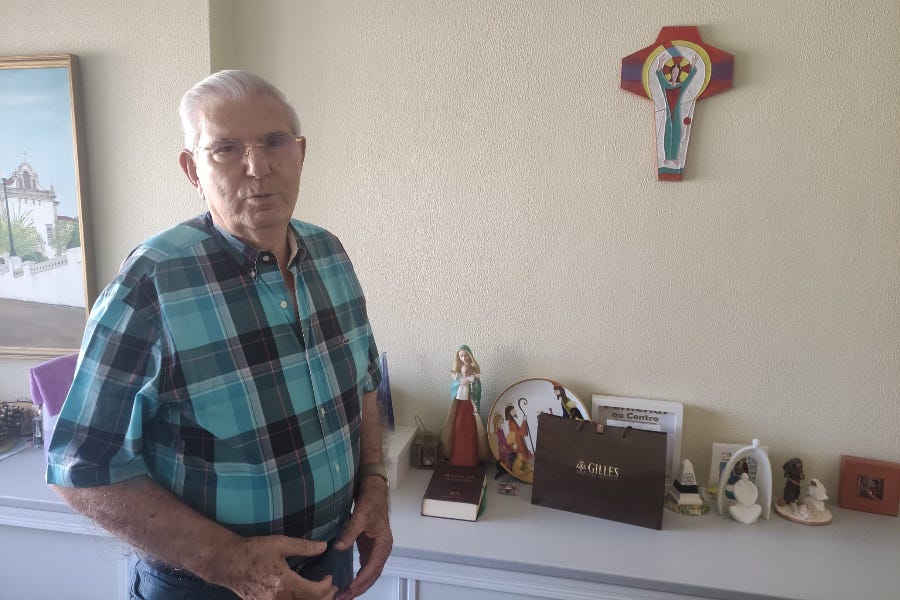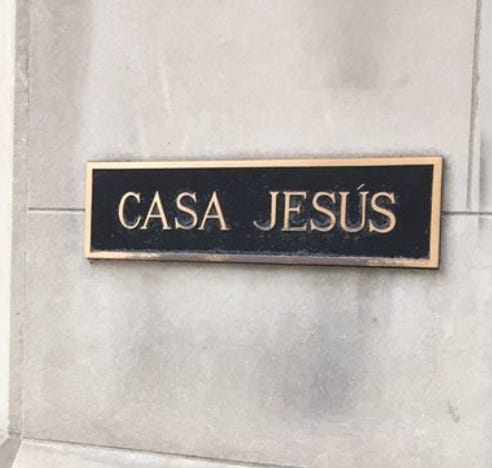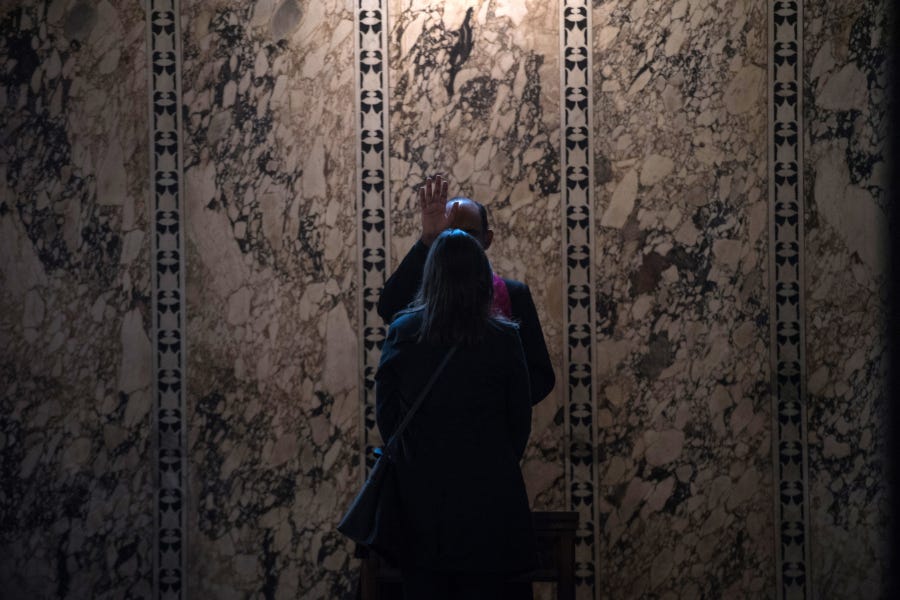One of Lisbon’s most notable landmarks is the enormous 18th-century Águas Livres Aqueduct, which was built to provide the population with drinking water. Its stone arches dominate a large part of the city, like the legs of a giant beast.

Nestled beneath those arches, just outside the forest of Monsanto, lies the neighborhood of Serafina. The setting would be picturesque if Serafina were not one of the most neglected neighborhoods in the Portuguese capital, one which for several decades not even the police dared enter.
Serafina still has its problems, but things have changed for the better, largely due to the positive influence of the St. Vincent de Paul parish. That is why on Aug. 4, Pope Francis will pay a visit to the parish social center, where he will meet with the man who made it all happen, Fr. Francisco Crespo.
I caught up with Fr. Francisco at his office. Above his desk was a photograph of him as a young man hugging his elderly father.
“I am the youngest of 13 siblings,” he told me. “My mother died when I was about nine. My father raised us. Two of my sisters became nuns, and he prayed very much that I would become a priest. I owe my vocation to him.”
I had expected to see a man bent under the weight of 82 years of age. Instead, I found a tall, vigorous, and casually dressed priest. If anything, he seemed tired of all the interviews he had been giving over the past weeks.
“The neighborhood was much worse back when I arrived,” he said. “We still have a lot of housing issues that need to be improved, but back then people lived in wooden shacks, with no hygiene. In the winter it was simply horrible.”
That was a long time ago, of course, because Fr. Francisco has been the pastor of Serafina for 45 years. Back then, he was with the Institute of Consolata Missionaries, which had been asked to look after the neglected community. But the priests who were named to serve there tended to move on quite quickly and relations with the locals were bumpy.
When Portugal had its revolution in 1974, driven by Marxist ideals, people began to occupy property that belonged to large companies or landowning families. In Serafina, some people tried to occupy the few institutions that the Church had managed to build, prompting Fr. Francisco’s immediate predecessor to leave his post.
“At the institute, we thought that we would either have to abandon this mission, or place somebody here who could get things done,” he recalled. “Nobody wanted to come here, so in the end, I asked them to let me take over. My superiors weren’t thrilled, but they let me come.”
“It was hard at first, but finally I managed to get some people to come and help me. I hired an employee and we put up a prefabricated building where we started operating a day center for the elderly, to get them out of their houses, off the street, and out of the taverns.”
“Once we’d done that, we started a daycare service for kids, so that parents could go to work, and then after-school activities. Through the work we were doing, people started to see that we were actually committed and we began to gain their trust.”
Throughout, he explained, several benefactors worked with him, including some elderly upper-class women, a wealthy German Jew who had moved to Portugal, and the German Evangelical Church, which contributed generously to the construction projects.
A promotion refused
Fr. Francisco had already served in a few different places, including a four-year stint in Fátima, where he oversaw the construction of a hotel managed by the missionaries.
It was only natural that at some point he would be asked to take on a different task. That day came in 1982, when he was told that the order wanted to make him provincial. He refused.
“On the one hand, I didn’t like the title or the job description,” he said. “On the other, it would have meant that I would have had to leave Serafina, and I knew that if that happened, nobody would want to replace me, and the work that I was doing would stall.”
“I went to speak to the Patriarch of Lisbon at the time, António Ribeiro, and told him about my predicament. He suggested I speak with my superiors, and tell them how I felt, and that if they didn’t agree, he would incardinate me. One week later, I had become a diocesan priest.”
Had he ever thought of asking to move to a different parish since then?
“I never asked, and the truth is, nobody ever suggested it either,” he said. “I knew well that if I left, nobody else would want to come here. I had a project, things were happening. I felt fulfilled.”
Like his predecessor Cardinal Ribeiro, the current Patriarch of Lisbon, Cardinal Manuel Clemente, is also fond of Fr. Francisco.
In a message to The Pillar, Clemente described the priest as “a magnificent example of absolute dedication to the good of the people he serves, in the example of Christ, who was as concerned with the spiritual good as he was with the nourishment of those who came in search of him.”
‘Lord, I will build a church eventually’
It has now been 45 years since Fr. Francisco first arrived in Serafina. The parish center has grown from a prefabricated warehouse to a modern building that cares for thousands of people every day. When they enter, they pass an inscription that says “Charity is evangelization.”
Perhaps surprisingly, the large and equally modern-looking church was the last part of the project to be built.
“My main concern was always to serve the people’s needs,” Fr. Francisco said. “In my prayers, I always said: ‘Lord, I will build a church eventually, but first I want to make sure I have what I need to fulfill people’s needs. Once I’ve done that, then I’ll build a church.’”
“This is the only way many of these people understand and accept the spiritual part. When we do good to them, then we are evangelizing. Now the church is full on Sundays.”
“And I’d love to see everybody practicing, but that doesn’t bother me very much, because I know that everybody gets what they need from this center. They come knocking on our door, they don’t go asking anywhere else.”
“This, to me, speaks to what the pope says so often, that we should work through charity.”
‘Journalists will lose interest in Serafina’
Generally speaking, Serafina is not the sort of place you visit unless you really have to. This made it all the more surprising when the Vatican announced that Pope Francis would be going there as part of his trip to Portugal for World Youth Day.
“I was caught by surprise. I never imagined it, and I still don’t quite believe it,” Fr Francisco told me. But he was eager not to make the pope’s gesture about himself.
“I see this as a sign that the Church is doing crucial work for society,” he said. “People need to know that most of the social work that is being done in this country is carried out by parishes. I hope people will see that the pope came to visit an institution that evangelizes through charity.”
And what did he expect the pope to say? “A word of encouragement, for us to keep up the work that we are doing. Because I know that when the pope leaves, the journalists will lose interest in Serafina, and everything will go back to the way it was. But we’ll still be here.”
‘We deserve this visit’
Outside of the parish center, I tried to speak with local residents, but mostly in vain. The few who overcame their distrust of journalists said only a few words before moving on.
A man from the former Portuguese colony of Guinea-Bissau was sitting at a bus stop. His clothes indicated that he was a Muslim, but when asked about the pope’s upcoming visit he was enthusiastic.
“It doesn’t matter if we’re Muslims or Catholics, the pope’s visit is a good thing for us,” he said. “There are some differences between us, but deep down we are all the same.”
Further down the road, several people milled around the door of a cafe. One of the clients, Elisabete Nunes, has worked at the parish center for 13 years and had plenty to say about Fr. Francisco.
“He never abandoned the community,” she said. “He fought for us and he achieved so much for us. If we have anything of value here, it is because of him. He always interceded for us. Everybody here loves him. He’s an emperor to us.”
As for the papal visit to Serafina, she said that many people still didn’t believe that it would happen.
“People see it as a miracle. But we deserve this visit. And, above all, Fr. Francisco deserves it,” she commented.
An extravagant man in a Hawaiian shirt ordered a beer for me while we were talking. He introduced himself as José Luís, or Zé Lisboa, to his friends. Occasionally he burst into song as he talked, recalling his past in the world of private security, and boasting about his six children, 12 grandchildren, and one great-grandchild — an impressive number considering that he was only 67 years old.
When the subject turned to the papal visit, though, he became serious.
“I was born here 67 years ago. Not in a maternity ward, but in a wooden shack. There were no roads, no services. We were surrounded by mud and human refuse. Do you know what the pope’s visit means to me?” he asked.
“This is the pope telling me it was worth being born here.”







